Coffee for Bean to cup machine

About Caprisette Coffee
Here’s how you discover your favourite coffee flavour: have you tried the Caprisette range of coffees, already loved by millions? Produced by us here at Coffee Friend, this line is super popular and, once you taste it, you’ll know why! Whether you’re after a rich espresso or a creamy latte, these one-of-a-kind coffees are roasted just right for all of your favourite recipes. Join the millions who have already fallen in love—we’re confident you will too!Caprisette Coffee Blends
So, how do you obtain the perfect cup of coffee? We think it’s all about experimenting, and Coffee Friend coffee lines are suited perfectly for that! The Black Crow White Pigeon specialty coffees let you try out different flavour profiles, the Parallel blends promise premium quality... And then there’s the Caprisette line, which offers versatile flavours that are just right for your daily cuppa. Plus, these coffees pair well with bean-to-cup machines, as well as in-cup brewing, French presses, moka pots, and filter coffee machines (just not manual filter brewing tools though). The Caprisette range offers a variety of unique flavours. For fans of milk, there’s “Crema”, which has been a huge hit ever since its introduction. For those who prefer their coffee naturally sweet, there’s “Dolce Vita”. Those who want to enjoy their coffee without the jitters associated with caffeine are bound to love the decaffeinated “Lullaby Decaf”. You can also give “Fragrante” and “Belgique” blends a try: “Fragrante’, the first blend in the line, has been a favourite for a long time thanks to its Brazilian notes of chocolate and nuts. Roasted in Belgium, “Belgique” has also been very successful. All Caprisette blends are available in the form of coffee beans. Those who don’t have a coffee grinder at home, or who want to speed up the brewing process, will be glad to find out there’s ground coffee on offer too. Or perhaps you use coffee pods at home? We have a solution for you as well: there are pods for Nespresso machines in the Caprisette range.Why Choose Caprisette?
Why is Caprisette loved by millions? The answer’s simple: this line combines quality and great taste. Each bean is roasted in the best European roasteries, guaranteeing maximum freshness. There’s a reason why this line has earned so many rave reviews and five-star ratings from you!Highest quality standards. From farm to cup, skilled professionals work hard to guarantee the best possible quality. Coffee farmers carefully harvest, process, and sort the beans, while roasters use their expertise to unlock the unique characteristics of each coffee and deliver a one-of-a-kind flavour.
Roasted in some of the finest roasteries. The beans are roasted in the best European roasteries located in Italy, Belgium, the Netherlands, and Lithuania. Each country contributes its own unique traditions and flavour profiles.
Freshness. We roast our Caprisette beans in small batches to keep them super fresh. This way, we can control every step of the roasting process. The result? Each cuppa is not only fresh, but also packed with subtle, natural flavours that only come about when your coffee is roasted just right.
Suited for all coffee recipes and brewing methods. Caprisette tastes amazing whether enjoyed black or mixed with your favourite milk or other add-ons. We’ve chosen the best coffee varieties and adjusted the roasting process to make sure your coffee tastes great when brewed using not only a bean-to-cup machine, but also a filter machine, a French press, a moka pot, or pretty much any other brewing tool.
Which One Should You Go For?
In the Caprisette range, you’ll find nine blends made up of beans roasted to different levels. What would this normally mean, you wonder? Well, dark-roasted beans are usually designed for intense espresso coffee, while medium- or light-roasted beans produce delicious, delicate filter coffee. However, as we’ve mentioned already, this range is roasted in a way that makes it suit all brewing methods.“Caprisette Fragrante”
A blend of Brazilian beans of a medium-dark roast (80% arabica and 20% robusta) that will appeal to fans of traditional coffee flavours. The aroma boasts a hint of peanut butter, while the taste is marked by notes of milk chocolate. A subtle walnut aftertaste lingers on your palate for a while after the drink is finished.
“Caprisette Belgique”
A blend of Brazilian and Honduran coffees (80% arabica and 20% robusta) bound to please lovers of traditional flavours. It boasts a medium-light roast, an intense aroma, and a full body. There’s a lingering aftertaste of dark chocolate and sweet caramel.
“Caprisette Crema”
This blend of Brazilian and Ugandan coffees combines arabica (80%) and robusta (20%) beans of a medium roast. Enjoy notes of caramel, bitter dark chocolate, and delicious nuts in each sip. Ideal for cappuccinos or lattes. Adding milk isn’t necessary though: the sweet notes of this variety come through in a cup of black coffee too.
“Caprisette Royale”
This blend of Brazilian, Mexican, Ugandan, and Indian coffees combines arabica (80%) and robusta (20%) beans of a medium roast. The rich sweetness of chocolate, hints of dried fruit, and light notes of berries make for a unique taste experience.
“Caprisette Italiano”
Reaching you straight from an Italian roastery, this coffee is a 100% arabica blend of Brazilian, Mexican, Indian, and Ethiopian coffees, all carefully handpicked and medium-roasted. It’s a real treat for the senses, with notes of sweet caramel, gourmet liqueur, and rich cacao.
“Caprisette Dolce Vita”
We’ve handpicked the sweetest Brazilian coffee beans, and selected a medium roast for them to make their natural sweetness stand out even more. Sipping on this 100% arabica will enable you to experience notes of milk chocolate, caramel, and almonds.
“Caprisette Professional”
This blend of Brazilian and Honduran 100% arabica beans is perfect for those who enjoy subtle flavours. Marked by a medium-light roast, it boasts sweet aromas of berries and caramel, combined with subtle hints of dark chocolate.
“Caprisette Intenso”
This medium-roasted blend of Brazilian and Vietnamese coffees is a mix of arabica (45%) and robusta (as many as 55%!) beans, guaranteed to provide that much-needed burst of energy. Plus, it’s super tasty, with hints of dark chocolate, roasted nuts, and a spicy kick that will leave you wanting more.
“Caprisette Lullaby Decaf”
This decaf coffee of a medium-dark roast combines the finest arabica and robusta beans from Brazil, Guatemala, and India. It offers a particularly smooth flavour, with notes of cashews, cacao, and wood.
Struggling to make your choice? Why not give coffee sets a try, and discover a bunch of Caprisette flavours at once? We’ve also got sets that come in gift boxes, beautifully packaged for any occasion.Got Questions? We’ve Got Answers!
Interested in other types of coffee? Coffee Friend’s team is here to guide you towards your perfect cup. Reach out to us by email or phone.-
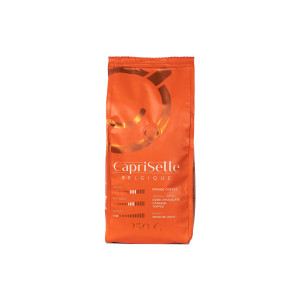
Ground coffee Caprisette Belgique, 250 g
£7.99 -
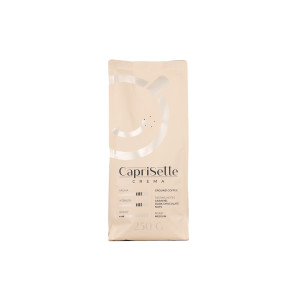
Ground coffee Caprisette Crema, 250 g
£7.99 -
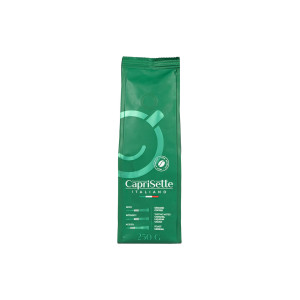 5.0Rated 5.00 out of 5(3)
5.0Rated 5.00 out of 5(3)Ground coffee Caprisette Italiano, 250 g
£7.99 -

Ground coffee Caprisette Royale, 250 g
£7.99 -
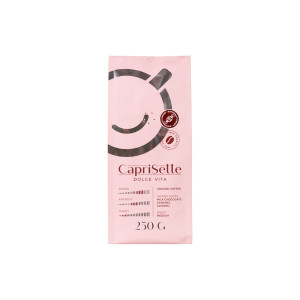
Ground coffee Caprisette Dolce Vita, 250 g
£7.99 -
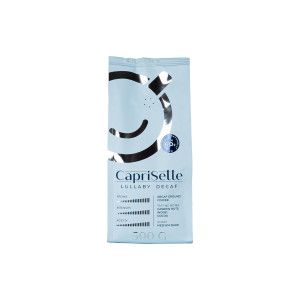
Decaf ground coffee Caprisette Lullaby Decaf, 500 g
£13.99 -
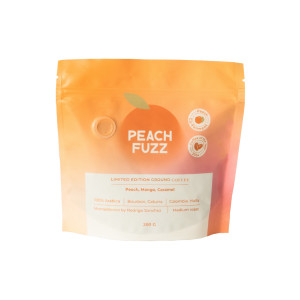 5.0Rated 5.00 out of 5(4)
5.0Rated 5.00 out of 5(4)Limited-edition ground coffee Coffee of the Year 2024 Peach Fuzz, 200 g
£13.99 -
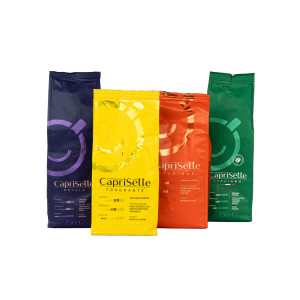
Ground coffee set Caprisette, 4 x 250 g
£28.56 -40%£47.60 -
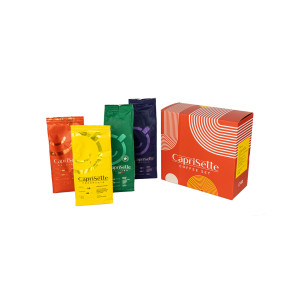
Ground coffee set Caprisette, 4 x 250 g in a gift box
£29.76 -40%£49.60 -
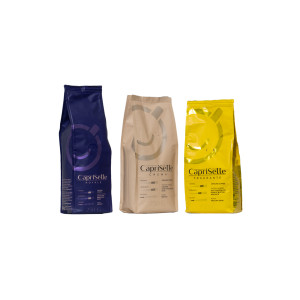
Ground coffee set Caprisette TOP, 3 x 250 g
£16.74 -40%£27.90 -
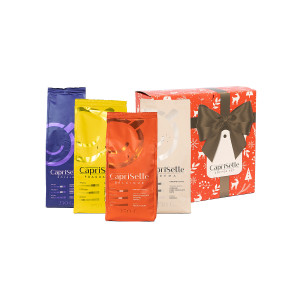
Ground coffee set Caprisette, 4 x 250 g in a Christmas gift box
-
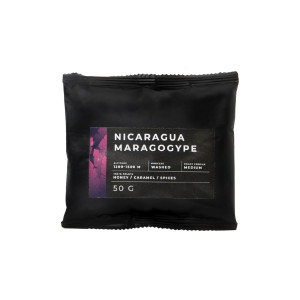
Ground specialty coffee Nicaragua Maragogype, 50 g
-
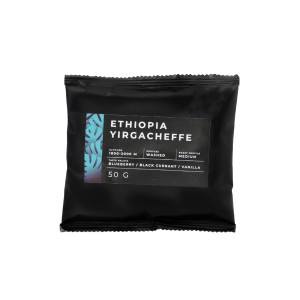
Ground specialty coffee Ethiopia Yirgacheffe, 50 g
-
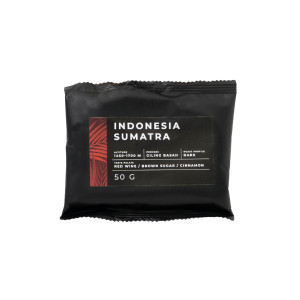
Ground specialty coffee Indonesia Sumatra, 50 g
About Coffee for Bean-to-Cup Machines
If you already own a bean-to-cup coffee machine at home or are currently thinking of getting one, you’re probably familiar with the main advantage of this kind of appliance: as its name suggests, it grinds coffee beans freshly for every cup you brew. When you look for the best coffee beans for bean-to-cup machines, the choice can be tricky though: after all, there are so many options on offer! So, what should you pay attention to when looking for the best coffee beans out there? What type of coffee suits a bean-to-cup machine? We’ll try and answer these questions below.
Coffee for Bean-to-Cup Machines: What Makes It Special and How to Find the Right One?
We’ll start by saying that the best coffee for bean-to-cup machines is the one designed for the espresso brewing method. When brewing coffee, these appliances use the kind of pressure that’s typical of espresso preparation (around 9–19 bar). What makes bean-to-cup coffee machines extra special though is the fact that they grind coffee beans freshly for each serving—and, to make it even more impressive, they do that automatically.
A bean-to-cup machine will do the hard work for you: all you’ll have to do is find the right coffee beans. Begin by browsing through espresso-compatible specialty, decaf or even pre-ground varieties. The latter can be a great choice too as long as your coffee machine is capable of using this type of coffee.
Best Coffee Beans for Bean-to-Cup Machine: Tips & Criteria
The most delicious coffee is always brewed using freshly ground coffee beans. That’s what makes bean-to-cup machines so awesome: they grind your coffee beans all on their own and serve you with a gorgeous cuppa in a flash. How do you find the best coffee beans for bean-to-cup machines though?
When it comes to flavour, there’s only one solution: you should try as much coffee as possible, whether it’s arabica, robusta, or a blend of both. The best coffee beans are those that are suited best to your personal taste! Flavour is only part of it, however—your coffee beans must be compatible with bean-to-cup coffee machines too. There are a few aspects to consider when searching for the right coffee beans: basically, it’s all about the brewing method and the roast level. Let’s get into it then!
Look for the word ‘ESPRESSO’. A great little shortcut is searching for the word ‘espresso’ on the packaging or in the online description of the coffee beans you’re eyeing. Not a fan of espresso? No worries: this type of coffee isn’t designed exclusively for the espresso recipe. All this word indicates is that the coffee is roasted in a way that’s suited for the espresso brewing method.
Search for a picture of a coffee machine. Instead of the word ‘espresso’, some coffee bags may contain a picture of a coffee machine. This is another sign of coffee that’s suited great for a bean-to-cup appliance, particularly indicating it as best coffee for bean to cup.
Medium to dark roast. No mention of espresso, and no coffee machine pictured on the packaging of your coffee either? If that’s the case, use roast level as a guide. Bean-to-cup machines generally require coffee of a medium to darker roast. Why’s that, you wonder? Lighter roasts result in coffee flavours being absorbed pretty slowly, while darker roasts are quicker to release the deliciousness hidden in them. The espresso brewing method is particularly quick, so coffee of a lighter roast may not have enough time to unveil its finest features, and the resulting brew will likely be pretty flavourless or too acidic.
Omniroast coffee. Omniroasting has been growing in popularity lately. What this word refers to is a roast profile that’s suited well for all brewing methods, bean-to-cup coffee machines included.
Those searching for the right roast should take a look at Coffee Friend’s own Caprisette line of coffee beans. This range of coffees has been created with owners of bean-to-cup appliances in mind, so they’re roasted in a way that helps unveil their finest flavours and aromas.
Espresso Coffee for Bean-to-Cup Machines: What Should You Know?
We’ve already mentioned that in the world of coffee, the word ‘espresso’ refers to both the classic recipe and the unique brewing method. When it comes to espresso coffee, it’s all about the latter. Using the espresso brewing method, bean-to-cup machines can serve you with numerous espresso-based drinks: from americano all the way to latte.
Whether you’re a fan of the espresso recipe or not, remember that espresso coffee beans are always the best coffee beans for bean-to-cup appliances. They’re usually dark-roasted too, which is perfect for the speedy espresso brewing technique.
Specialty Coffee or Coffee Blends?
Lots of people are still convinced that the best beans for bean to cup machines are suited best for 100% arabica beans or arabica and robusta blends, so specialty coffees are often overlooked by owners of this type of appliance. This isn’t necessarily the right way to go about it though. Curious to find out why?
Well, first of all, it all depends on the kind of coffee you’re going to prepare. Are you a fan of espresso, or do you prefer milk-based drinks? Your personal taste is part of the equation too: specialty coffees tend to be marked by well-balanced acidity and a particularly rich taste, while coffee blends are usually subtler and more delicate.
If the specialty coffee you’re eyeing is roasted in a way that’s suited great for the espresso brewing method, you can absolutely use it for your bean-to-cup machine. There are plenty of coffees like that in Coffee Friend’s own Black Crow White Pigeon range of specialty coffees. Another great option is the Parallel line of specialty coffee blends. It’s perfect for those curious to find out what flavours are typical of different coffee-growing regions: choose “Parallel 12” for a taste of Africa, go for “Parallel 17” if Asia sounds intriguing, or try “Parallel 36” to discover what coffee from the Americas is all about.
As long as it boasts the right roast profile, specialty coffee can introduce you to a bunch of unique flavours when brewed in a bean-to-cup machine. Specialty varieties tend to be particularly flavourful and deliciously acidic. The acidity we’re talking about here can also be described as fruitiness, or a mixture of sour and sweet notes often found in fine wines. In contrast, coffee blends are usually subtler and more balanced: while they lack the vivid tasting notes of specialty varieties, their subtlety is suited great for milk-based coffees. Specialty beans, on the other hand, are more likely to please those who love espresso.
Best Ground Coffee for Bean-to-Cup Machines
Even though bean-to-cup machines are known for their ability to grind coffee beans freshly, some of them boast the option of using pre-ground coffee too (those that do are equipped with a special ground coffee drawer). If this sounds appealing, you can definitely give ground coffee a try—just make sure to choose coffee of a medium to dark roast.
The right grind size is important too, of course. Not all ground coffees on the market are suited for bean-to-cup appliances: those that are ground too finely can end up causing blockages, while coarse grinds may result in watery, weak brews. Just keep the criteria we’ve discussed earlier in mind: your best bet is pre-ground coffee suited for the espresso brewing method, which means a medium to finer grind.
Decaf Coffee Beans for Bean-to-Cup Machines
Decaf coffee beans are a great choice for those who love the taste of coffee, yet can’t or don’t want to consume caffeine for whatever reason. The same criteria apply to both regular coffee beans and decaf varieties: look for the word ‘espresso’, and keep the roast level in mind.
There’s an additional criterion that should come into play as well. We’re talking about the decaffeination method. Your best bet is coffee that has it indicated clearly on the packaging or in the e-shop description. Look for natural decaffeination methods, like CO2 decaffeination or the Swiss Water Process. You can give Coffee Friend’s bestsellers a try: that’s Caprisette Lullaby Decaf and the specialty Black Crow White Pigeon Colombia Decaf.
Locally Roasted Coffee: Always Fresh
When it comes to finding the best coffee beans out there, freshness is one of the key criteria. How do you know how fresh your coffee is though? You can’t go wrong with locally roasted coffees: not only will you get to experience the finest flavours, but you’ll support local businesses at the same time too! The rule here is simple: the shorter the supply chain, the fresher the coffee. If you’re keen on giving locally roasted coffee beans a try, make sure to keep the same criteria in mind. As long as you choose beans of the right roast, locally roasted coffee can open up whole new horizons for your taste buds.
Maximum Variety: Coffee Sets for Bean-to-Cup Machines
Are you one of those people who tend to get bored if they drink the same coffee day after day? If so, we’ve got a solution for you: why not give coffee sets a try? They include several different coffees, so there’s numerous flavours to explore. If you’re looking for something extra special, take a look at Caprisette coffee sets designed specially for bean-to-cup appliances. Created by us here at Coffee Friend, Caprisette is our best-selling range suited great for both black coffees and creamy milk-based drinks. While we’re on the subject of coffee sets, by the way: did you know that some bean-to-cup machines are equipped with two bean containers, while others boast two separate coffee grinders as well? Using an appliance like that, you can treat yourself to different flavours one right after the other!
Robusta Coffee Beans for Bean-to-Cup Machines
Lots of people ask us whether they should choose robusta or arabica coffee beans for their bean-to-cup machine. To tell you the truth, 100% robusta is rarely encountered on the market. Due to its unusual flavour profile and high caffeine content, you’re more likely to find it mixed with arabica. Well-balanced and suited great for milk-based coffees, arabica and robusta blends are a popular choice amongst those who own a bean-to-cup machine. Coffee connoisseurs often say that the addition of robusta results in a more full-bodied brew, which means that the coffee is thicker and boasts a firmer layer of crema. When mixed with arabica, robusta adds a touch of bitterness too, which blends well with the acidity of arabica beans.
Arabica Coffee Beans for Bean-to-Cup Machines
Compared to arabica and robusta blends, 100% arabica is more fragrant, flavourful, and fruitier. Depending on your own personal taste, you can use arabica coffee beans when preparing any beverage with the help of your bean-to-cup machine, be it espresso, regular black coffee or your favourite milk-based drink. If 100% arabica sounds like something you’d like to try, pay attention to the flavour profile of the coffee you’re eyeing: those who enjoy acidity should look for notes of fruit or berries, while others should prioritise notes of caramel or chocolate.
Any Other Questions?
Curious to find out more about coffee of other types and flavours? Feel free to reach out to our consultants: they’re always ready to help. You’re welcome to visit our physical stores as well: we’ll brew you a cup of coffee using one of our bean-to-cup machines, and guide you towards the right coffee variety for you!
